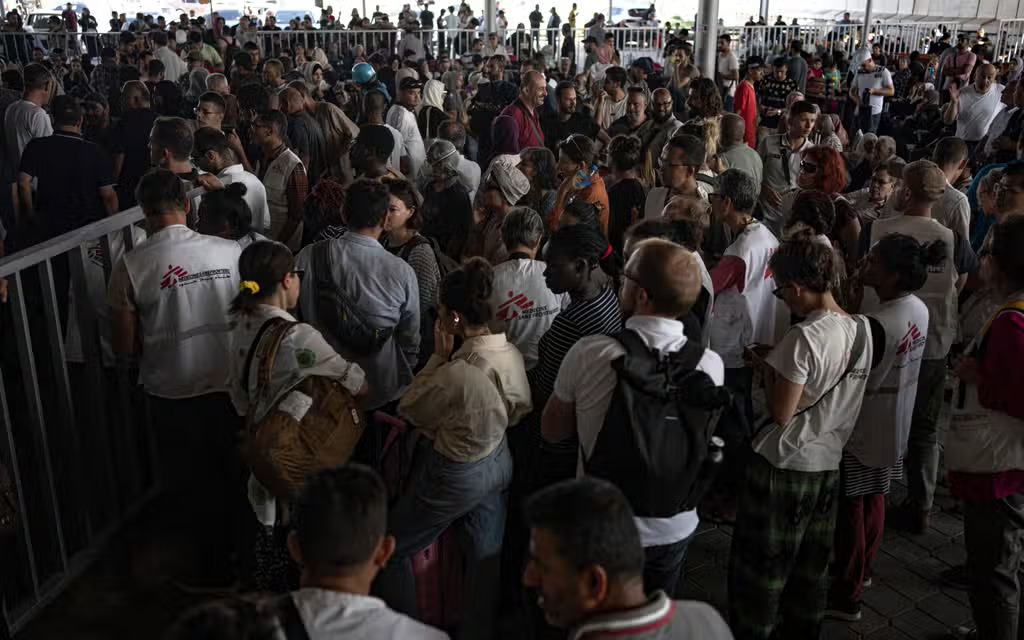The Rafah crossing did not reopen on Sunday despite UK hopes that the situation could be resolved to allow more Britons to escape from Gaza.
The impasse in delicate diplomatic relations between Egypt, Israel and Hamas means UK nationals waiting by the border checkpoint have been stranded for a second day.
Deputy Prime Minister Oliver Dowden said during a Sunday media round that the UK Government was “hopeful that the crossing will reopen again today” and that additional British citizens would be able to leave Gaza.
But the Foreign Office confirmed that the key border post remained closed to foreign nationals on Sunday, having been shut on Saturday following an apparent row between Israel and the Palestinians over evacuating injured patients.
We are disappointed that the Rafah crossing remains temporarily closed today
British nationals have spoken about being turned away from the crossing on Saturday when it was unexpectedly sealed.
Groups assisting people trying to leave through Rafah said they struggled to get hold of contacts on Sunday as Gaza experienced its third total communications blackout since the start of the war on October 7.
Rafah is the only Gaza crossing that is not controlled by the Israelis and is currently the sole exit point for foreign nationals and entry way for aid.
A spokeswoman for the Foreign, Commonwealth and Development Office (FCDO) said it was “disappointed that the Rafah crossing remains temporarily closed today”.
She said the department was “using all diplomatic channels to press for its reopening in co-ordination with our international partners”.
“It is vital that the safe passage of people, including all foreign nationals, and humanitarian aid can continue,” she said.
Insiders have suggested that the issues which caused the gate to close are not insurmountable. It is not clear what caused the three-way diplomatic agreement to collapse.
Around 100 UK nationals have used the Rafah crossing to leave the besieged enclave since it opened to foreign nationals last week.
The total number the UK is trying to secure passage for is thought to be in the low hundreds, with as many as 200 British nationals and their dependents in Gaza registered with the authorities to leave.
Among those to have successfully passed through the crossing are the parents-in-law of First Minister Humza Yousaf.
They have have arrived in Scotland safely after fleeing the conflict in the Gaza Strip, with SNP leader Mr Yousaf sharing a family photo on X, formerly Twitter, which included his wife Nadia, and her parents, Elizabeth and Maged El-Nakla.
It comes as a group assisting those on the ground in the territory said some British citizens are facing the “excruciating” prospect of leaving without their family members when the border point does reopen.
Support Families In Gaza said the Foreign Office had left those without UK passports off the safe passage list into Egypt, meaning some people could have to leave relatives behind in the bombarded enclave.
Group spokeswoman Louise Harkin said: “Gaza is currently the least safe place on the planet, almost 10,000 people are confirmed dead, almost half of whom are children, yet the Government now wants to separate British children from their mothers and families.
“We call upon the Government to allow British citizens to bring their families with them.”
The FCDO said people who require a visa will need one in advance of travel to the UK, including dependants of British nationals, such as spouses, partners and children under 18.
The fighting in the Israel-Hamas war has continued into a fifth week, with the violence having been ignited by the Palestinian militant group’s bloody raids that killed 1,400 people and saw about 240 people taken hostage.
In retaliation, Israel has pounded the 25-mile strip with air strikes and sent ground troops into the north of Gaza in a bid to crush the territory’s rulers.
The continued incursion and bombing come despite appeals from the likes of the United States and the UK for a suspension of the fighting to get aid to desperate civilians.
Before the communications outage on Sunday, Palestinian health officials said Israeli warplanes struck two refugee camps in central Gaza, killing at least 53 people and wounding dozens.
The Hamas-run health ministry said more than 9,700 Palestinians have been killed in the territory in nearly a month of war, a number likely to rise as Israeli troops advance into dense, urban neighbourhoods.
Labour’s shadow defence secretary John Healey said there was a “danger of Israel going too far” in its retaliation and spoke about the need to better “protect innocent lives”.
He said Labour continued to support the UK Government’s position of pushing for a pause in the fighting and was not calling for a ceasefire, despite pressure mounting internally for leader Sir Keir Starmer to do so.
The soaring death toll in Gaza has sparked growing international anger, with tens of thousands taking to UK streets on Saturday to demand an immediate ceasefire.
The Metropolitan Police said a total of 29 people were arrested in London, including for inciting racial hatred, other racially motivated crimes, violence and assaulting a police officer.
Mr Dowden expressed his “grave concerns” that a pro-Palestinian protest on Armistice Day on November 11 could spill over into “violence and instability” while commemorative events are taking place in central London.
On Sunday, pro-Israel demonstrators joined a vigil in Parliament Square to call for the immediate and unconditional release of all hostages taken by Hamas.
Organisers arranged for a display with heart-shaped balloons attached to pairs of shoes to represent those who were taken, along with pictures of the victims.
Layla Moran, a Liberal Democrat MP who has family in Gaza, addressed a vigil for peace in Oxford.
In a clip shared by Ms Moran on X, she told those gathered: “My fear for (my family) is indescribable.
“And that fear is matched by those who have connections to Israel. Grief, fear — what horrible things to have in common.”
